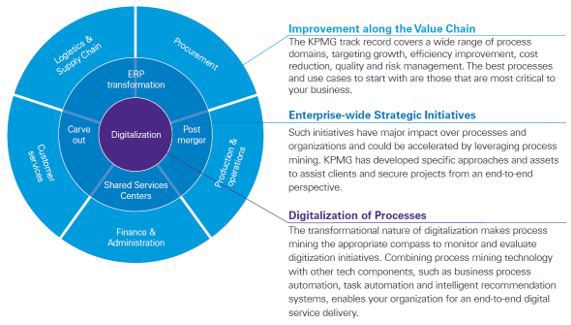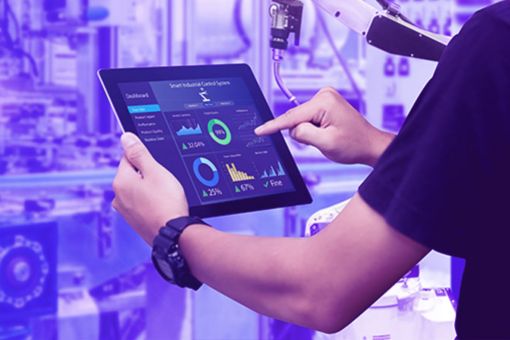Many organizations are currently using technology to improve their processes in front-, mid- and back office in order to meet customer demands. Insights in how processes are performing in reality is key to make the necessary improvements. Process Mining is one of the main catalysts for that initiative.
The world of business is changing, and it is moving faster every day. To keep up, executives need to make major business decisions more quickly, more accurately and driven by more data than ever before. With all that information to identify, collect, and filter, the pace of these decisions overtakes the human ability to make them. KPMG can help clients meet this challenge.
Factual analyses of business processes
When dealing with the impact of digital transformation within an organization, one of the biggest challenges is understanding how processes are actually being executed.
Process experts often design processes expecting that their execution will be faithful to the design. However, designs tend to be incomplete and not executable in practice, and people often overlook or bypass designed processes and work in silo’s. These challenges are more prevalent than ever due to digital transformation programs, adoption of global business services, and the introduction of bots and (other) artificial intelligence into the business processes.
Process mining offers a set of novel tools and techniques for the factual analysis of business processes. It takes process execution data available in the underlying information systems and maps and visualizes how the processes have been executed in reality. In this manner, process mining helps you to remove all assumptions and guesswork from processes.
Getting value out of data using process mining
Process mining is process and system agnostic, it can be used to analyse a wide range of processes, from back-office to customer-facing processes. This feature provides the flexibility to leverage process mining in various use case areas. Examples are process optimisation, process automation, ERP implementation, system migration, internal/external audit, and many more.
With that in mind, KPMG offers a number of solutions that are designed to help your organization get the maximum value out of your data. Our solutions are tailored to assist in various areas within your business, ranging from logistics and production, through accounting and finance, to IT services and HR.

Why using KPMG process mining solutions
KPMG builds process mining solutions that combine the analytical and the operational into one intelligent layer. These solutions improve understanding of execution gaps within your business and take immediate automatic action to remove them. The KPMG solutions powered by process mining are designed with user-specific views for each role in the organization, giving insight into their daily operations and the possibility to adjust priorities to changing needs.
- We have one of the largest teams of data scientists and consultants specialized in process mining.
- We have a broad service offering covering transformation programs, shared service center optimization, business process excellence, compliance monitoring, and robotics and process automation.
- KPMG has strong experience in incorporating process mining technology for efficient management of process risk and compliance. We link process mining with the requirements of first and second lines of defense.
- We know and work closely with all process mining vendors.
KPMG and Celonis
We have a strategic global partnership with Celonis to deliver business integration services and out of the box content based on our experience in the field. Specific solutions for the Celonis platform are:

KPMG ERP Transformation App
Accelerate your S/4 HANA migration. The KPMG ERP transformation app packages KPMG’s better practices to make an ERP transformation/migration a success by quickly identifying high impact deviations and high gain value pockets, assessing change impact to ensure seamless transition and adoption and optimizing operations to achieve transformation targets within the program’s budget and timelines.
For more information or a demo, please reach out to Himalini Aklecha: aklecha.himalini@kpmg.nl

KPMG Digital Risk Monitoring App
Your future of Risk Management. The KPMG Digital Risk Monitoring App allows you to be more in control against lower costs involved. Built on decades of KPMG’s risk management IP, the app is an end-to-end solution for real-time risk and control monitoring enabling all lines of defence with automated risk analysis, automated control testing, prioritized workflow follow up, and effective root cause analysis for prevention purposes.
For more information or a demo, please reach out to Romain Emens: emens.romain@kpmg.nl

KPMG Procurement Cost Intelligence App
Unlock the potential of your procurement organization by using actionable insights. Our solution offers an accurate view of your processes and reveals opportunities as a starting point. Views provide proactive insights, prioritized tasks, next-best-action recommendations, and suggested automations, ensuring every team member can execute each process step for the best possible outcome. Real-time data ingestion is the lifeblood of the EMS. Connect to and gather time-stamped event logs from operational systems and user clicks on desktops in real time to understand your operations like never before. The platform leverages KPMG’s robust, proprietary database which gleans information from our engagements with 1,000+ private companies and large volumes of third party data.
For more information or a demo, please reach out to Jens Rohde: jrohde@kpmg.com
Talk to our process mining experts
KPMG has developed robust solutions to help clients around the world harness their data, along with the tools to apply it efficiently and accurately. These solutions range from tax to audit to advisory, and across multiple sectors, using KPMG professionals’ expertise to turn data into insights into value and drive businesses into the future.
Do you want to know more about process mining at KPMG and how we can help your organization? Feel free to contact us.
Anuj Kumar, KPMG India
Takashi Niidetani, KPMG Japan
Jo Sigurd Pedersen, KPMG Nordics
Farukh Amini, KPMG United Kingdom
Abhijit Varma, KPMG United States


